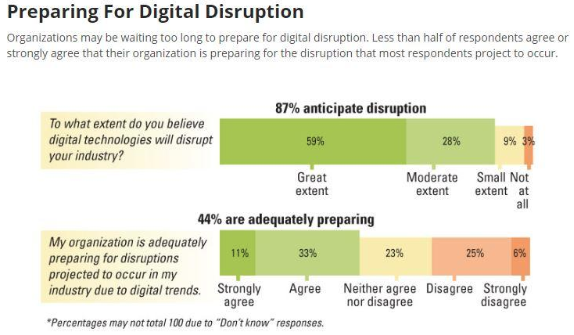 Source: MIT Sloan Management Review[/caption]
So, why isn’t adoption of digital technologies a priority for more small- to medium-sized insurers? While many see the opportunities presented by digital technologies, perhaps they don’t believe the likelihood is high that digital will actually disrupt their own organization. But the authors of the research note that, if digital technologies represent an opportunity for your organization, they also represent a threat for your competitors — and vice versa.
I get it, change is hard… but, the argument, “we are not in a financial position to prioritize” is irrelevant to the discussion of digital technology investments. Competitors aren’t waiting for your company to be in a better “financial position” before they act. Moreover, because at some point in the coming years insurers will need to replace their growing faction of retirement-age employees with a younger, more tech-savvy labor force. And in a war for the best talent, the A and B players have absolutely no desire to work on outdated systems. So, what does that mean for the future of your company?
See also: Digital Insurance, Anyone?
Just remember, technology is an accelerator for your company and your staff. In other words, the more digital technologies that are put into play, the greater and faster the return. Those insurers that ignore its call will fall further and further behind until they reach the tipping point and slowly fade away. Remember what happened to Blockbuster Video when it failed to adapt in a time of digital change. Don’t be a Blockbuster in a Netflix world.
Source: MIT Sloan Management Review[/caption]
So, why isn’t adoption of digital technologies a priority for more small- to medium-sized insurers? While many see the opportunities presented by digital technologies, perhaps they don’t believe the likelihood is high that digital will actually disrupt their own organization. But the authors of the research note that, if digital technologies represent an opportunity for your organization, they also represent a threat for your competitors — and vice versa.
I get it, change is hard… but, the argument, “we are not in a financial position to prioritize” is irrelevant to the discussion of digital technology investments. Competitors aren’t waiting for your company to be in a better “financial position” before they act. Moreover, because at some point in the coming years insurers will need to replace their growing faction of retirement-age employees with a younger, more tech-savvy labor force. And in a war for the best talent, the A and B players have absolutely no desire to work on outdated systems. So, what does that mean for the future of your company?
See also: Digital Insurance, Anyone?
Just remember, technology is an accelerator for your company and your staff. In other words, the more digital technologies that are put into play, the greater and faster the return. Those insurers that ignore its call will fall further and further behind until they reach the tipping point and slowly fade away. Remember what happened to Blockbuster Video when it failed to adapt in a time of digital change. Don’t be a Blockbuster in a Netflix world.Small Insurers and Digital Priorities
The argument, “we are not in a financial position to prioritize,” is irrelevant to the discussion of digital technology investments.

 Source: MIT Sloan Management Review[/caption]
So, why isn’t adoption of digital technologies a priority for more small- to medium-sized insurers? While many see the opportunities presented by digital technologies, perhaps they don’t believe the likelihood is high that digital will actually disrupt their own organization. But the authors of the research note that, if digital technologies represent an opportunity for your organization, they also represent a threat for your competitors — and vice versa.
I get it, change is hard… but, the argument, “we are not in a financial position to prioritize” is irrelevant to the discussion of digital technology investments. Competitors aren’t waiting for your company to be in a better “financial position” before they act. Moreover, because at some point in the coming years insurers will need to replace their growing faction of retirement-age employees with a younger, more tech-savvy labor force. And in a war for the best talent, the A and B players have absolutely no desire to work on outdated systems. So, what does that mean for the future of your company?
See also: Digital Insurance, Anyone?
Just remember, technology is an accelerator for your company and your staff. In other words, the more digital technologies that are put into play, the greater and faster the return. Those insurers that ignore its call will fall further and further behind until they reach the tipping point and slowly fade away. Remember what happened to Blockbuster Video when it failed to adapt in a time of digital change. Don’t be a Blockbuster in a Netflix world.
Source: MIT Sloan Management Review[/caption]
So, why isn’t adoption of digital technologies a priority for more small- to medium-sized insurers? While many see the opportunities presented by digital technologies, perhaps they don’t believe the likelihood is high that digital will actually disrupt their own organization. But the authors of the research note that, if digital technologies represent an opportunity for your organization, they also represent a threat for your competitors — and vice versa.
I get it, change is hard… but, the argument, “we are not in a financial position to prioritize” is irrelevant to the discussion of digital technology investments. Competitors aren’t waiting for your company to be in a better “financial position” before they act. Moreover, because at some point in the coming years insurers will need to replace their growing faction of retirement-age employees with a younger, more tech-savvy labor force. And in a war for the best talent, the A and B players have absolutely no desire to work on outdated systems. So, what does that mean for the future of your company?
See also: Digital Insurance, Anyone?
Just remember, technology is an accelerator for your company and your staff. In other words, the more digital technologies that are put into play, the greater and faster the return. Those insurers that ignore its call will fall further and further behind until they reach the tipping point and slowly fade away. Remember what happened to Blockbuster Video when it failed to adapt in a time of digital change. Don’t be a Blockbuster in a Netflix world.






